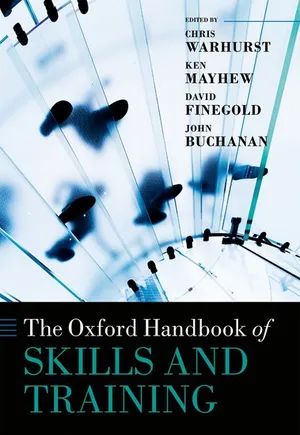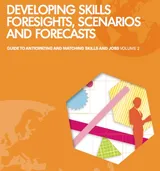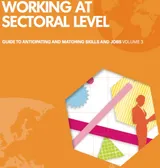IER News & blogs
Oxford Handbook of Skills and Training published
 The Oxford Handbook of Skills and Training has just been published by the Oxford University Press. Co-edited by IER Director Chris Warhurst, it features sections on: Concepts, Definitions and Measurements of Skill; Education, Training and the Development of Workforce Skills; Skills Demand and Deployment; Skill Outcomes; Differing Skill Systems; and Current Challenges to Policy. Read more.
The Oxford Handbook of Skills and Training has just been published by the Oxford University Press. Co-edited by IER Director Chris Warhurst, it features sections on: Concepts, Definitions and Measurements of Skill; Education, Training and the Development of Workforce Skills; Skills Demand and Deployment; Skill Outcomes; Differing Skill Systems; and Current Challenges to Policy. Read more.
Credentials and self-reported skill gain do not measure the same
 As a part of the LEGACY project, Dr Heike Behle recently presented a paper in which two ways to measure learning gain were critically assessed: Credentials and self-assessed improvement of specific skills.
As a part of the LEGACY project, Dr Heike Behle recently presented a paper in which two ways to measure learning gain were critically assessed: Credentials and self-assessed improvement of specific skills.
Both ways have drawbacks: Credentials can be an effective way of measuring student learning within a particular class, since most institutions have a scaled grading system already in place. It is problematic, however, to use across classes and institutions and it does not measure the ‘distance travelled’ during higher education. On the other hand, self-assessed improvement of skills will always be subjective and will differ according to individuals’ personality and their personal and HE-related circumstances such as gender and subject studied. It is also important to notice that both data is censored, i.e. improvement is not unlimited.
Using Futuretrack data, Heike compared both ways and found that those who increased their learning gain using credentials are less likely to assess their skills highly, both variable correlate negatively. The findings are currently being prepared for publication. Reported in THES.
IER researchers contribute to the Government Office for Science Future of skills and lifelong learning Foresight project
The Government Office for Science is looking at how changes in technology and an ageing population affect what skills the UK will need in the future. The project also considers how investment in skills and encouraging lifelong learning can have a positive impact on productivity. This project aims to provide policy-makers with evidence on the current and future state of skills and lifelong learning in the UK. IER researchers have contributed to the evidence base on:
Skills and Lifelong Learning: Gaps in Training Provision - This report looks at current trends and challenges for policymakers in the UK skills system, including how geography affects provision of skills, individual access to skills and training, the role of migration and the role of careers advice.
- Green, A., Hogarth, T., Barnes, S-A, Gambin, L. and Sofroniou N. (2016) The UK's Skill System: Training, Employability and Gaps in Provision. London: Foresight, Government Office for Science.
The UK skills system: how aligned are public policy and employer views of training provision? - This report explores trends and developments in UK skills policy, employer views on training and issues in realising an employer owned skills system.
- Green, A. and Hogarth, T. (2016) The UK skills system: how aligned are public policy and employer views of training provision? London: Foresight, Government Office for Science.
Guides to anticipating and matching skills
Two guides, authored by IER’s Professor Rob Wilson, which are part of the ETF, ILO and Cedefop series of guides on skills anticipation and matching have been published.
 Volume 2 covers the development of skills foresights, scenarios and skills forecasts, and aims to support setting up skills forecasting systems at national level by means of quantitative and/or qualitative approaches. The guide is intended specifically for countries which are starting to develop systems of skill needs anticipation.
Volume 2 covers the development of skills foresights, scenarios and skills forecasts, and aims to support setting up skills forecasting systems at national level by means of quantitative and/or qualitative approaches. The guide is intended specifically for countries which are starting to develop systems of skill needs anticipation.
Bakule, M., Czesaná, V., and Havlícková, V. (Part A), Kriechel, B., Rašovec, B. and Wilson, R. (Part B) (2016) Developing Skills Foresights, Scenarios and Forecasts - Guide to Anticipating and Matching Skills and Jobs (Vol. 2). Luxembourg: Publications Office of the European Union, (ISBN: 978-92-9157-655-5)
 Volume 3 examines sectors as the key points where changes in skills demand occurs, the term sector being used to define specific areas of economic activity. It provides an overview of the role of sectoral bodies and what they do in anticipating changing skills needs. The country case studies show how skills are analysed at the sector level in different contexts and conditions.
Volume 3 examines sectors as the key points where changes in skills demand occurs, the term sector being used to define specific areas of economic activity. It provides an overview of the role of sectoral bodies and what they do in anticipating changing skills needs. The country case studies show how skills are analysed at the sector level in different contexts and conditions.
Wilson, R., Tarjáni, H. and Rihova, H. (2016) Working at Sectoral Level - Guide to Anticipating and Matching Skills and Jobs (Vol. 3). Luxembourg: Publications Office of the European Union, (ISBN: 978-92-9157-657-9)
Nurturing the talent pipeline in Northern Ireland
 The way in which teenagers think about their future in education and employment has a significant impact on what becomes of them as adults. Good-quality careers education and young people's exposure to the world of work can make a real difference to academic, social and economic outcomes, according to IER's Dr Deirdre Hughes OBE Principal Research Fellow and Chair of the Senior Advisory Group for Skills Northern Ireland. Deirdre is chairing a breakfast meeting with NI business and education leaders, including a keynote address by Peter Weir MLA, Minister of Education, Northern Ireland.
The way in which teenagers think about their future in education and employment has a significant impact on what becomes of them as adults. Good-quality careers education and young people's exposure to the world of work can make a real difference to academic, social and economic outcomes, according to IER's Dr Deirdre Hughes OBE Principal Research Fellow and Chair of the Senior Advisory Group for Skills Northern Ireland. Deirdre is chairing a breakfast meeting with NI business and education leaders, including a keynote address by Peter Weir MLA, Minister of Education, Northern Ireland.
Organised by Prospects Events, sponsored by NIE Networks and supported by Ulster University, a brand new major Skills Northern Ireland event at the Titanic Exhibition Centre on 8 & November 2016 offers young people and parents the opportunity to meet employers, discover careers and learn more about Northern Irelands major skills shortages.
